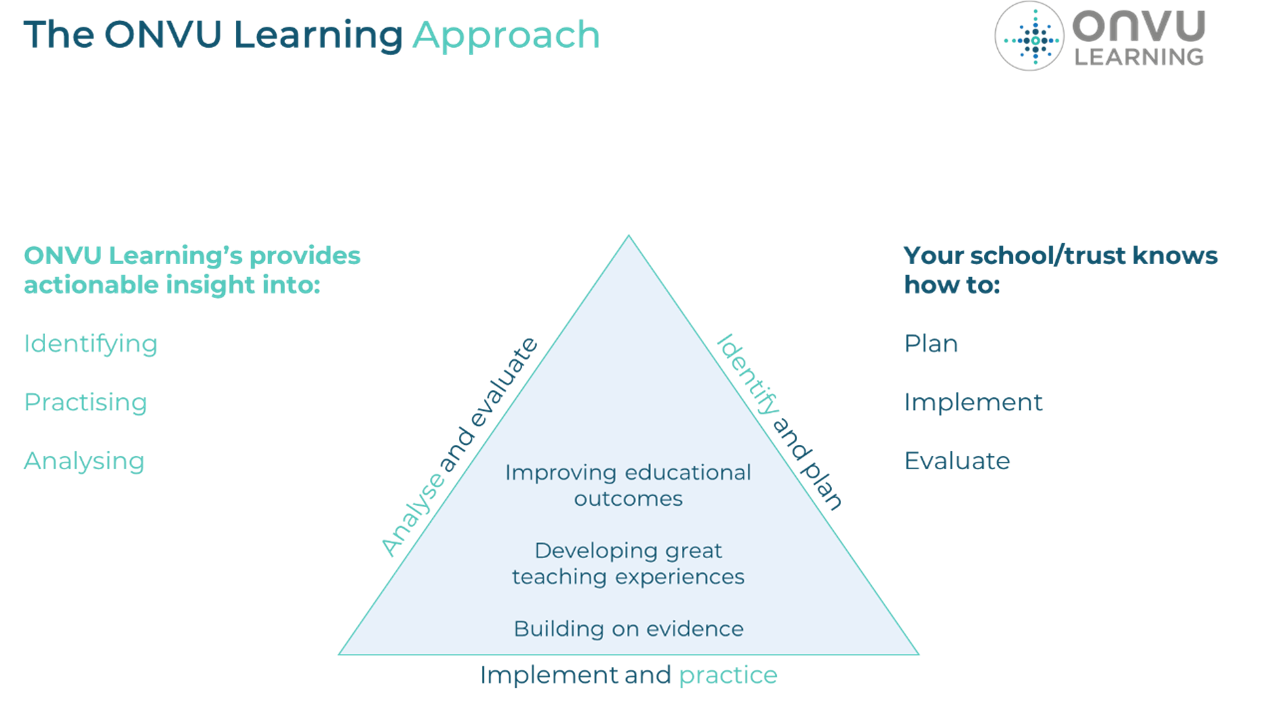- Teacher Professional Development 'A thought About' By Matt
- 5 Minute Read



 Help teachers see the big picture by allowing them to focus on what they know..
Help teachers see the big picture by allowing them to focus on what they know..
This blog is about the principles that I believe should be in place that are most likely to enable teachers’ professional development. Teachers are professionals who have chosen to study and develop their skillset with a focus on children’s learning. Teachers’ have a predisposition towards helping others learn knowledge and skills at an early stage in life. They seek to best prepare those young people for their adult lives. This sits at the heart of why teachers become teachers. Like any other profession, the environment in which teachers operate changes quite regularly. I have written on the topic of ‘change’ before, which you can read here.
From a teachers’ perspective, what they want and need to achieve for their students and themselves professionally doesn’t really change. While we know more now about how children learn and can identify better where and why learning occurs differently for different children than ever before, the core purpose at the heart of a teacher’s desire to teach remains the same as it was the day they chose to embark on a teaching career. Indeed, the core of a teacher’s aims has never changed. But change demands change. Continuous professional development (CPD) is an inevitable, necessary and usually welcomed aspect of a teacher’s role. At best, it will help teachers get ahead of emerging issues that demand shifts in approach and subject matter. The difficulty is that CPD can feel like very hard work on its own, let alone applying any new skills to a teacher’s day-to-day classroom practice. To observe a lesson in the traditional way takes time to set up, do and review. Even more when observers have to travel between sites in a MAT, for instance.
Frameworks. Courses. Programmes. Tools. Gaps. Theories. Plans. Reviews. I think that the challenge teachers face today is massive, distracting complexity that exists beyond their immediate domain. What they’re asking for is simple, precise and consistent focus on their core purpose and CPD to enhance their classroom practice. Nothing new there, I hear you say. After all, many disputes in the teaching profession revolve around issues associated with teachers teaching vs teachers doing other things in a school that arguably help (or not) teaching. The issue for me is that in an effort to help teachers zero in on the ‘thing that’ll make the difference’, the mark can be easily missed. Imagine the scenario: The attainment gap between disadvantaged students and their peers is widening, particularly in Maths. All teachers now need to undertake training into how to incorporate numeracy into every lesson”. You’ve seen it (or similar) before. While that approach may well work in some cases, numerically centered teaching and learning won’t become habitual to teachers who haven’t been used to it and may not help those students for whom the approach was designed. The aim will be missed. The training is ineffective. The link to the classrooms of many teachers is lost.
The likelihood of low impact CPD is particularly high when leaders depend on INSET days to deliver big, school or trust-wide messages and attempt to link their implications to classroom practice there and then. We’ve all been there. I am admittedly guilty of delivering some of these events. The INSET day begins and we hear about the successes and challenges that have emerged from an analysis of the data. What follows tends to involve a series of training tasks that are based on those identified challenges. But how often do teachers have the opportunity to digest their new knowledge, turn that into teaching and learning activities, test them in a low stake environment (their classroom) and, seek and receive support on their terms and thus improve overall?
I think that the sector has long been moving away from an almost complete dependency on the ‘five INSET days per year plus a mid-year appraisal meeting to assess a teacher’s development’ model. But too often it remains the case that the link between professional development content and practical application in classes remains lost or at best far too vague. Teachers love learning. They love the challenge and want to learn new skills that will best prepare them for the challenges that they face to best serve their students. This requires teachers to have available to them every day the tools that enable them to hone their skills, apply and check new approaches and do so without judgement or an overriding demand to fulfil an abstract target. To state the obvious, teachers need to be trained to teach children. Teachers need to be supported through well-planned and focused professional development to refine their teaching skills, widen their repertoire and build on firm foundations of effective teaching practice. They need less noise, fewer short-term objectives and greater alignment between their day-to-day and the training that they receive.
There are many great schools, Trusts and professional development providers that have geared their CPD approaches toward classroom focused activities. They seek innovative solutions to underpin their teachers’ work without adding to their workload, interweaving effective actions steps and the day-to-day. Content is being chunked and disseminated to help teachers and their coaches develop skills sustainably, building on what works and seeking marginal gains. Theories for learning are being distilled and resharpened focus on long-held fundamentals is emerging e.g. building lesson plans around Rosenstein’s principles of instruction. A sensible balance is being restruck between abstract theory and applied pedagogy.
 Edtech can only exist to aid education. It should never aim to replace teachers (it can’t) nor should it aim to displace learning from centres of education, like school classrooms. The pandemic has demonstrated in stark terms the high significance of social interactions to children’s development and learning. As teachers’ professional development approaches continue to shift towards more precise inputs into teachers’ practice day-to-day, schools and multi-academy trusts need to be able to maximise the impact of that CPD. In simple terms, teachers want to feel confident that the changes they’ve made or their typical approach is improving learning. Up to now, they depend on peers and experts to provide an informed view through observations and analysis of information that derives from the teaching i.e. assessment outcomes. But what if teachers could see for themselves how they and their learners got on across one or a series of lessons? What if teachers could pick and choose snippets of their lessons that they self-reflect on, analyse, share with trusted professionals and build their teaching practice on? Wouldn’t it be great if teachers were encouraged to refer to their own practice that they can see and hear, and then identify for themselves what worked in one place but not the other and how that impacted the student’s learning? ONVU Learning is about giving autonomy to teachers over their incremental development and working with leaders of learning to ensure that developments fit neatly within their overarching ambitions.
Edtech can only exist to aid education. It should never aim to replace teachers (it can’t) nor should it aim to displace learning from centres of education, like school classrooms. The pandemic has demonstrated in stark terms the high significance of social interactions to children’s development and learning. As teachers’ professional development approaches continue to shift towards more precise inputs into teachers’ practice day-to-day, schools and multi-academy trusts need to be able to maximise the impact of that CPD. In simple terms, teachers want to feel confident that the changes they’ve made or their typical approach is improving learning. Up to now, they depend on peers and experts to provide an informed view through observations and analysis of information that derives from the teaching i.e. assessment outcomes. But what if teachers could see for themselves how they and their learners got on across one or a series of lessons? What if teachers could pick and choose snippets of their lessons that they self-reflect on, analyse, share with trusted professionals and build their teaching practice on? Wouldn’t it be great if teachers were encouraged to refer to their own practice that they can see and hear, and then identify for themselves what worked in one place but not the other and how that impacted the student’s learning? ONVU Learning is about giving autonomy to teachers over their incremental development and working with leaders of learning to ensure that developments fit neatly within their overarching ambitions.
 ONVU Learning’s mission is to change the way teachers are supported, developing their skills so that their students thrive in happy, effective and safe learning environments. To do this, we partner with schools, trusts and professional development providers so that between us we build on a culture of collaborative improvement and achieve higher impact teacher development. Teachers, leaders and coaches can fine tune their CPD programmes, quickly and identify what works well and what needs development together. There is no reliance on observers being available at specific times to undertake disruptive lesson visits and the cost of the equivalent observation can be reduce by up to 95% per lesson. Across multiple schools, Trust leaders can provide more support by reducing the need to travel so often between sites and by encouraging peers across their family of schools to collaborate and share their great practice. This is just part of the ONVU Learning Way of boosting teachers' practice and underpinning their CPD! We are an EdTech provider that supports and nurtures teachers and learners in classrooms, giving them the capabilities to prepare for whatever the future brings.
ONVU Learning’s mission is to change the way teachers are supported, developing their skills so that their students thrive in happy, effective and safe learning environments. To do this, we partner with schools, trusts and professional development providers so that between us we build on a culture of collaborative improvement and achieve higher impact teacher development. Teachers, leaders and coaches can fine tune their CPD programmes, quickly and identify what works well and what needs development together. There is no reliance on observers being available at specific times to undertake disruptive lesson visits and the cost of the equivalent observation can be reduce by up to 95% per lesson. Across multiple schools, Trust leaders can provide more support by reducing the need to travel so often between sites and by encouraging peers across their family of schools to collaborate and share their great practice. This is just part of the ONVU Learning Way of boosting teachers' practice and underpinning their CPD! We are an EdTech provider that supports and nurtures teachers and learners in classrooms, giving them the capabilities to prepare for whatever the future brings.

Read more from Matt![]()

The School of the Future Guide is aimed at helping school leaders and teachers make informed choices when designing the learning environments of the future using existing and upcoming technologies, as they seek to prepare children for the rest of the 21st century – the result is a more efficient and competitive school.
KEEP IN TOUCH WITH ONVU LEARNING AND RECEIVE THE LATEST NEWS ON EDTECH, LESSON OBSERVATION, AND TEACHER TRAINING AND DEVELOPMENT.